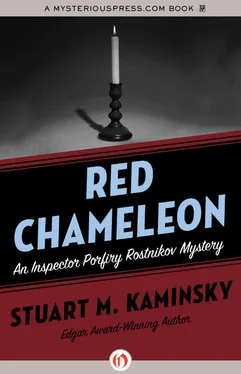Stuart Kaminsky - Red Chameleon
Здесь есть возможность читать онлайн «Stuart Kaminsky - Red Chameleon» весь текст электронной книги совершенно бесплатно (целиком полную версию без сокращений). В некоторых случаях можно слушать аудио, скачать через торрент в формате fb2 и присутствует краткое содержание. Год выпуска: 2012, ISBN: 2012, Издательство: MysteriousPress.com/Open Road, Жанр: Полицейский детектив, на английском языке. Описание произведения, (предисловие) а так же отзывы посетителей доступны на портале библиотеки ЛибКат.
- Название:Red Chameleon
- Автор:
- Издательство:MysteriousPress.com/Open Road
- Жанр:
- Год:2012
- ISBN:978-1-4532-6632-8
- Рейтинг книги:4 / 5. Голосов: 1
-
Избранное:Добавить в избранное
- Отзывы:
-
Ваша оценка:
- 80
- 1
- 2
- 3
- 4
- 5
Red Chameleon: краткое содержание, описание и аннотация
Предлагаем к чтению аннотацию, описание, краткое содержание или предисловие (зависит от того, что написал сам автор книги «Red Chameleon»). Если вы не нашли необходимую информацию о книге — напишите в комментариях, мы постараемся отыскать её.
Red Chameleon — читать онлайн бесплатно полную книгу (весь текст) целиком
Ниже представлен текст книги, разбитый по страницам. Система сохранения места последней прочитанной страницы, позволяет с удобством читать онлайн бесплатно книгу «Red Chameleon», без необходимости каждый раз заново искать на чём Вы остановились. Поставьте закладку, и сможете в любой момент перейти на страницу, на которой закончили чтение.
Интервал:
Закладка:
“I see,” Karpo said, unable to fathom the cryptic turns of mind of the limping, near block of a man at his side. Porfiry Petrovich Rostnikov was an enigma in the life of Emil Karpo but one that the younger man accepted, for he respected his superior’s abilities.
But Karpo knew that Rostnikov was not infallible. Occasionally, he failed to see something, to detect. The example was immediate. Rostnikov obviously had no idea that Karpo planned to make himself the next target of the rooftop Weeper.
Sasha Tkach had a headache. He was not much given to drinking vodka. He was well aware of the damage it did to those around him, and he often had the impression that at night Moscow was a vast matrix of drunks who staggered about like giddy or morose zombies. He had heard that it was worse in other countries-Iceland, the United States-but Moscow surely had a high percentage of those who sought escape in alcohol. One of those who did so was his neighbor Bazhen Surikov, the carpenter. Surikov liked to suggest that he was a painter. He wore a small beard like a caricature of a 1920s Parisian artist and even dabbled in painting, though Sasha thought the few works he had seen by the wiry man were at best mediocre. However, Sasha did not consider himself an art expert. He did, however, consider himself a man with many problems.
He and Maya had not exactly quarreled the night before. She had attempted to talk about their future, and he had attempted to avoid it. He was tired, sore from the bout with the blacksmith, angry at his assignment, and unable to think of a solution to the problem of what to do when the very visible child in Maya’s stomach decided to face the world.
Sasha’s mother, Lydia, offered no help, only her usual wisdom. “It will work out. Each day passes, and a new one comes. We have bread on the table, shoes on our feet, a bed to sleep on.”
One could not quarrel with such wisdom, especially when one’s mother was nearly deaf and interested in preserving platitudes rather than coping with reality.
And so when Bazhen Surikov had suggested that Sasha join him in his apartment to look at a new painting, Sasha had gone, leaving mother, wife, and soon-to-come child in their two-room apartment. And when Bazhen had shown him the idiotic painting of a horse or a boar or a bear on its knees, Sasha had been properly complimentary, which resulted in the offer by Bazhen of a shared bottle of vodka. Nearly two hours later, when Sasha had managed to return to his apartment, Maya looked at his smiling face and put down her book, undecided about whether to get angry or weep. She did neither but turned to go in the bedroom, realized her mother-in-law was in there, and then faced Sasha with a pleading look that said clearly, “See, I have no place to go when I am hurt, angry. And soon there will be a baby, your baby.”
The next day, the vodka was no longer in effect, the sun was hot, and Sasha had no heart to pretend that he was the spoiled son of a member of the Politburo. He had some sense, he thought, of how an actor must feel who has a hangover, an ulcer, a nagging wife, and a dying friend and who must still step upon the stage to pretend for two hours that he is Alexander the Great.
Sasha had already had a meeting with Porfiry Petrovich Rostnikov; he had gone to two locations on his list and crossed out both, convinced that they were not what he was searching for. He had been especially disturbed by the fact that in his early-morning meeting, Porfiry Petrovich, who usually gave suggestions and attention and consideration to even minor cases, seemed to be indifferent to Sasha’s investigation in spite of the fact that pressure was now being exerted because “an important official” had been the victim of the car thieves.
Sasha had taken the green metro line, the Gorkovsko-Zamoskvoretskaya line, to the end, gotten off at Rechnoi Vokzal, and wandered in unfamiliar territory in search of the building from which it had been reported that a large new car had been seen. The report was almost two weeks old and had come from a woman who, the report noted, was a notorious local busybody, the kind who would come up to you on the street and tell you to straighten your tie. Sasha Tkach knew the type; one of them had married his father and now lived in Sasha’s small apartment.
Finding the building was difficult, but he continued. The directions had been poor, but find it he did, a one-story brick building that looked as if it had once been a small factory. There was a large car or truck entrance with a sliding metal door closed over it. The windows of the building were dirty, and one could not see because the curtains were closed. It meant nothing, this twenty-third location he had checked in two weeks while others were seeking snipers who shot policemen and mysterious old gunmen who stole candlesticks. Life was not always fair.
Sasha found a door at the side of the building, blinked once, sighed deeply, feeling sorry for himself, knocked, and entered before someone could say, “Come in,” or, “Stay out.”
Beyond the door, Tkach found himself facing a quite beautiful blond young woman, full and athletic looking, who wore no makeup and needed none.
“That door is supposed to be locked,” she said, her eyes meeting Sasha’s. “This is a private club for potential automobile mechanics.”
Tkach looked past her without letting his eyes roam. There was a wooden partition behind them, a dirty wooden partition painted gray, behind which he could hear the scraping of machinery, the clanking of metal on metal. There was something defiant and attractive about the young woman holding a small wrench in one hand, her other hand on her hip. Even the smudges of dirt on her dark overalls were somehow appealing. A shiver of fear and physical attraction passed through the detective, and he felt confident that if he had not finally found what he was looking for, he had surely stumbled upon something the woman was trying to hide.
“My name is Pashkov,” he said as the woman grabbed his sleeve to turn him toward the door. “Your address was given to me by a mutual acquaintance who made me promise not to reveal his name.”
“I don’t know what you are raving about,” she said, her face close to his, close enough for him to smell her and close enough for her to sense his slight trembling, the trembling of a wicked hangover.
“My father is a member of the Politburo,” Sasha said quickly and thickly as she opened the door and pointed out with her wrench.
“How fortunate for you,” she said sarcastically.
“I’m looking for an automobile,” he tried, standing in front of the door. “A very good automobile.”
She didn’t slam the door. He tried to fix a slightly vapid smile on his face as he examined her. Her fine smooth face almost hid her emotions, but Tkach had been an investigator for almost six years, and he saw suspicion flicker in her eyes. He saw no sign, however, of fear and decided that in many ways this was a most formidable and admirable woman.
“Who sent you here?”
“No,” he said, shaking his head. “No names. I don’t want yours. You don’t want mine.”
“I already have yours.”
“I forgot,” Tkach said. “I was drinking with a friend last night-”
“Come back in,” she said, reaching out to lead him back through the door. Before she closed it, she stepped out and looked around. Tkach watched her with admiration. A woman like this could take charge, find apartments, cars, get things done, and have time left over for massive warmth and babies.
“I’m looking for a car for myself,” he said when she faced him. He spoke above the noise beyond the gray partition. “I’m willing to pay reasonably, and if things work out, I have friends who might also be willing …”
She was examining his face intently. Sasha was well aware of it, but he did his best not to reveal what he was seeing.
Читать дальшеИнтервал:
Закладка:
Похожие книги на «Red Chameleon»
Представляем Вашему вниманию похожие книги на «Red Chameleon» списком для выбора. Мы отобрали схожую по названию и смыслу литературу в надежде предоставить читателям больше вариантов отыскать новые, интересные, ещё непрочитанные произведения.
Обсуждение, отзывы о книге «Red Chameleon» и просто собственные мнения читателей. Оставьте ваши комментарии, напишите, что Вы думаете о произведении, его смысле или главных героях. Укажите что конкретно понравилось, а что нет, и почему Вы так считаете.












